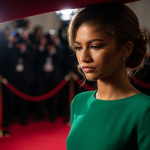Noel Clarke’s Libel Bid Against The Guardian Dismissed: A Blow to Star’s Reputation
London, UK – In a significant legal development that has reverberated through the entertainment industry, acclaimed actor and filmmaker Noel Clarke has lost his libel case against The Guardian newspaper. The High Court in London today ruled that the newspaper’s reporting, which detailed allegations of sexual harassment and assault against Clarke, was substantially true, marking a decisive victory for the publication and a substantial blow to the star’s public image and legal standing.
The case, which has been closely watched by media and legal professionals alike, stemmed from a series of articles published by The Guardian in July 2021. These articles presented testimonies from 20 women who accused Clarke of a range of misconduct, including sexual harassment, unwanted touching, bullying, and the use of his position to exploit and intimidate others. Clarke, a prominent figure in British television and film, known for his roles in ‘Doctor Who’ and his own popular film series ‘Kidulthood’ and ‘Adulthood,’ vehemently denied all allegations, initiating legal proceedings against The Guardian for libel, defamation, and breach of privacy.

The Genesis of the Legal Battle
The Guardian’s explosive exposé, published in the summer of 2021, sent shockwaves through the UK’s creative industries. The detailed accounts from multiple accusers painted a starkly different picture of Clarke’s public persona, transforming him from a celebrated talent into a figure facing grave accusations of misconduct. The articles were the result of an extensive investigation by the newspaper, which meticulously documented the alleged behaviour over several years. Clarke’s response was swift and categorical; he issued a statement denying all allegations of criminal wrongdoing and stating that his intentions were never to harm or exploit anyone.
However, the weight of the testimonies, coupled with the detailed nature of the reporting, soon led to a legal confrontation. Clarke’s legal team filed a libel suit, arguing that the articles were false, damaging to his reputation, and that The Guardian had failed to take reasonable care in verifying the claims. The lawsuit sought substantial damages and an injunction to prevent further publication of the offending material. This legal challenge was not just about financial compensation; it was a clear attempt to publicly vindicate Clarke’s name and discredit the allegations that had tarnished his career, leading to him being suspended by his talent agency and productions being halted.

The Court’s Verdict: A Scrutiny of Truth
In a judgment delivered by Mr. Justice Johnson, the High Court meticulously examined the evidence presented by both sides. The core of the legal dispute revolved around the defence of justification, a legal principle that allows a publisher to win a libel case if they can prove that the defamatory statements were substantially true. The Guardian’s legal team presented a robust defence, bringing forward detailed testimonies and evidence to support their reporting.
The judge’s ruling found that The Guardian had successfully proven the truth of many of the allegations made against Clarke. Specifically, the court concluded that Clarke had engaged in certain behaviours that amounted to sexual harassment, assault, and discriminatory conduct. These findings were based on the consistency and credibility of the accusers’ accounts, which the judge deemed to be compelling. Mr. Justice Johnson stated in his judgment that “the claimant’s case on libel had failed and the defence of justification had been made out.” This statement underscored the court’s belief in the veracity of the accusations as reported by the newspaper.
The ruling effectively meant that The Guardian was within its rights to publish the stories based on the evidence presented and upheld by the court. For Clarke, this was a devastating outcome, directly contradicting his assertion that the reporting was false and malicious. The judge’s assessment of the evidence would have involved a thorough review of witness statements, corroborating evidence, and the overall conduct of the individuals involved. The sheer volume of accusers and the consistency of their narratives were likely key factors in the court’s decision.

The Impact on Noel Clarke’s Career and Reputation
The consequences of these allegations and the subsequent court ruling for Noel Clarke are profound and far-reaching. Even before the court’s final decision, the initial reports had a significant impact on his professional life. His talent agency, Independent Talent Group, dropped him, and production on his Sky TV series ‘Brassic’ was halted. The suspension of his career was a clear indication of the gravity with which the industry treated the accusations.
Losing the libel case, and having the core of the allegations deemed substantially true by a High Court judge, will undoubtedly solidify the negative perceptions surrounding his conduct. For an industry that is increasingly sensitive to issues of workplace harassment and abuse, such a ruling can be career-ending. Clarke, who had built a considerable following and a reputation as a champion for diverse talent in British cinema, now faces an uphill battle to regain any semblance of his former standing.
The court’s decision not only validates the reporting of The Guardian but also provides a powerful precedent for victims of misconduct who choose to come forward. It signals that, in the face of credible and corroborated allegations, the truth can prevail, even against powerful individuals. The legal battle has been a public spectacle, laying bare personal and professional lives, and its conclusion will undoubtedly fuel ongoing discussions about accountability and power dynamics within the entertainment world.

The Guardian’s Defence and the Importance of Investigative Journalism
The Guardian, a newspaper renowned for its commitment to investigative journalism and holding powerful figures to account, has consistently defended its reporting. Their legal team presented a comprehensive defence, highlighting the thoroughness of their investigation and the reliability of their sources. The newspaper’s victory in this libel case is being hailed as a significant win for press freedom and the public’s right to know.
Speaking after the verdict, a spokesperson for The Guardian stated, “We are pleased that the court has found in our favour. We are committed to reporting on matters of public interest and holding to account those who abuse their position and power. We stand by our reporting and the testimonies of the women who bravely came forward.” This statement underscores the newspaper’s belief in the importance of their role in uncovering and reporting on misconduct, even when it involves prominent individuals.
The legal battle itself was a complex undertaking, requiring extensive preparation and the presentation of considerable evidence. The outcome suggests that The Guardian’s investigative team acted with diligence and a strong basis for their reporting. In an era where misinformation can spread rapidly, particularly through social media, the ability of reputable news organizations to conduct thorough investigations and report accurately remains crucial. This case serves as a testament to the value of rigorous journalistic practices and the protection afforded to those who engage in them responsibly.

Broader Implications for the #MeToo Movement
The Noel Clarke case and its resolution carry significant weight in the ongoing discourse surrounding the #MeToo movement. The movement, which gained global prominence in 2017, has empowered individuals, particularly women, to speak out against sexual harassment and assault, challenging established power structures and demanding accountability. Clarke’s legal battle, while focused on libel, is intrinsically linked to this broader societal shift.
The High Court’s decision to dismiss Clarke’s libel claim and uphold the substantial truth of The Guardian’s reporting can be seen as a reinforcement of the #MeToo era’s principles. It suggests that the legal system can, and will, acknowledge and validate the testimonies of those who have experienced abuse, even when those accused are powerful figures. This outcome could embolden other potential victims to come forward, knowing that their voices may be heard and believed.
However, it also highlights the challenges and risks associated with speaking out. The accusers in this case have endured a lengthy and public legal process. The success of The Guardian in proving the truth of its reporting will likely be seen by many as a victory for the women who courageously shared their experiences. It reinforces the idea that speaking truth to power, even when difficult, is essential for creating more equitable and respectful environments, particularly within industries like entertainment that have historically been criticized for their handling of such issues.

The Future of Noel Clarke’s Career and Public Perception
With the libel case now concluded, the focus shifts to the long-term impact on Noel Clarke’s career and public perception. The High Court’s judgment leaves little room for ambiguity regarding the court’s findings on the allegations reported by The Guardian. Rebuilding a career and public trust after such a significant legal defeat, and with accusations of this nature being substantiated in court, presents an immense challenge.
It is unlikely that production companies and broadcasters will be quick to re-engage with Clarke, given the legal precedent set by this ruling. The entertainment industry, like many others, is increasingly mindful of its reputation and the potential repercussions of associating with individuals who have faced credible allegations of misconduct that have been legally validated. Clarke’s future in the industry remains uncertain, with many predicting a significant downturn in his professional opportunities.
The case serves as a stark reminder of the consequences of alleged misconduct and the power of investigative journalism. While Clarke maintained his innocence throughout the legal proceedings, the court’s verdict has significantly altered the narrative surrounding him. The resolution of this libel case will undoubtedly be studied and discussed for some time, offering insights into the intersection of media, law, and allegations of sexual misconduct in the public sphere.

Conclusion: A Definitive Judgment with Lasting Repercussions
The High Court’s decision to dismiss Noel Clarke’s libel case against The Guardian represents a definitive legal judgment that has far-reaching implications. The ruling that the newspaper’s reporting was substantially true on key allegations has validated the accusers’ accounts and The Guardian’s investigative work. For Noel Clarke, this is a devastating blow to his reputation and career, effectively closing the door on his public defence against the accusations made against him.
The case has illuminated the complex and often challenging terrain of libel law, particularly when it intersects with public allegations of misconduct. It has also underscored the vital role of a free and investigative press in holding individuals accountable. As the dust settles on this high-profile legal battle, its echoes will likely continue to resonate within the entertainment industry and beyond, influencing discussions on accountability, the #MeToo movement, and the enduring power of truth in the face of adversity.














